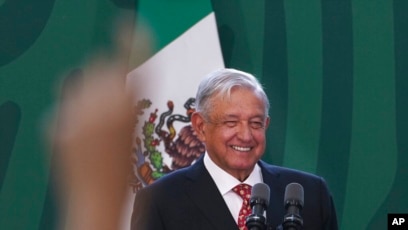
Mexicans vote whether president Andres Manuel Lopez Obrador should stay or go
Published on April 11, 2022 at 1:35 PM by Face of Malawi
Mexicans began voting Sunday in a divisive national referendum championed by President Andres Manuel Lopez Obrador on whether he should step down or complete his six-year term.
While recall elections in other countries tend to be initiated by political opponents, Mexico’s vote is the brainchild of Lopez Obrador, who enjoys an approval rating of nearly 60 percent.
The 68-year-old president, who was elected in 2018, attended a polling station near the presidential palace with his wife soon after voting began at 8 am (1300 GMT) across most of the country.
“Let no one forget that the people are in charge,” he said afterward.
Supporters of the referendum the first of its kind in Mexico say it is a way of increasing democratic accountability, giving voters the opportunity to remove the president due to loss of confidence.
“Now we have the chance to change what’s not right. There have been presidents who, after being elected by the people, ended up serving other interests,” Benigno Gasca, a 57-year-old mathematician and musician, told AFP.
But critics see it as an expensive propaganda exercise and an unnecessary distraction from the many challenges facing the country, including drug-related violence, poverty and the rising cost of living.
“It’s a useless exercise money thrown away,” said Laura Gonzalez, a 62-year-old retired teacher.
Experts say turnout is likely to be well below the 40-percent level needed for the vote to be legally binding.
Opposition parties have urged Mexicans to abstain from voting in what they call a “populist exercise.”
Eyes on turnout
Some 93 million voters are able to participate in the midterm referendum, which was incorporated into Mexico’s constitution in 2019 at Lopez Obrador’s initiative.
Most of the signatures that were collected in order for the vote to happen came from his supporters.
Given the popularity of the anti-corruption austerity advocate, his presidency is not at risk “at all,” said political analyst Martha Anaya.
On the contrary, the referendum could give impetus to his policy agenda, such as controversial energy reforms, she said.
The president also has his eye on the 2024 elections and the prospects for his party and possible successors, including Mexico City Mayor Claudia Sheinbaum.
The Mexican constitution limits presidents to one term, and Lopez Obrador has vowed to retire in 2024, following accusations by opponents that the referendum is a step towards trying to stay in power.
Lopez Obrador enjoyed an approval rating of 58 percent in March, although that was far below a peak of 81 percent seen in February 2019, according to a poll of polls by the Oraculus firm.
The president accuses the National Electoral Institute of sabotaging the referendum in collusion with his political opponents.
The body, which unsuccessfully sought a larger budget, said it would set up around 57,500 polling stations, compared with 161,000 in a normal national election.
Voting will end at 6 pm (2300 GMT) in most of the country, with the result expected to be announced late Sunday.
Lopez Obrador has overseen a series of referendums since taking office on controversial issues including his “Maya Train” railroad project, and canceling a partially finished airport for Mexico City.
A public consultation held in August on whether to prosecute his predecessors for alleged corruption drew only a small fraction of voters to the polls.


